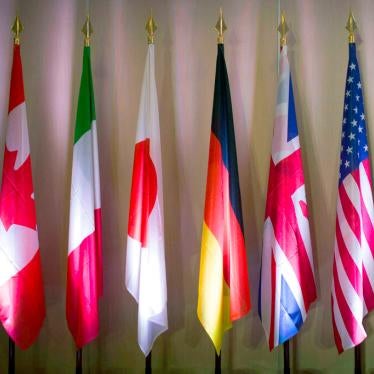The Uzbek government refused to allow a civil society group to hold a conference on the death penalty in Tashkent yesterday, Human Rights Watch said.
“Once again, the Uzbek government has revealed its hostility toward nongovernmental organizations,” said Rachel Denber, acting director of Human Rights Watch’s Europe and Central Asia Division. “It is again stopping debate on important human rights issues.”
Mothers Against the Death Penalty and Torture, a local group, planned to hold a conference, “Death Penalty: Analysis, Tendencies and Realities,” on December 5 in Tashkent. The conference was sponsored by the Organization for Security and Cooperation in Europe (OSCE), the British embassy and Freedom House. On December 3, a representative of the hotel where the conference was to take place informed the group that government authorities had told them in person not to allow their premises to be used for the conference.
On December 4, a representative of the National Center for Human Rights, a department under the Presidential Administration, told the Mothers Against the Death Penalty and Torture that the conference had been prohibited from going ahead. The Ministry of Foreign Affairs told diplomats that the meeting could not take place because the group was not a registered organization.
In 2002, the Ministry of Justice had denied the registration application of Mothers Against the Death Penalty and Torture. After a ministry official told the group that the ministry would not register a group with that name, the group in January reapplied for registration under the name Mothers Against Crimes Against the Individual. Although the Ministry of Justice is obliged by law to inform an applicant of its decision within two months, to date the group has received no reply.
Uzbekistan has a long history of refusing to register independent human rights organizations and treating their activities as effectively illegal. All but two independent national human rights groups—the Independent Human Rights Organization of Uzbekistan and Ezgulik, registered in March 2002 and March 2003 respectively—remain banned and vulnerable to harassment by the authorities. Each registration occurred only after sustained international pressure.
The European Bank for Reconstruction and Development (EBRD) in March adopted a country strategy for Uzbekistan that set three human rights benchmarks for the government to fulfill, one of which is the registration and free functioning of independent civil society groups. The bank gave the government a one-year deadline for compliance with these benchmarks.
“Unfortunately this is just another example in a long list of setbacks for fulfilling the human rights benchmarks set by the EBRD earlier this year,” said Denber. “The international community must firmly and publicly condemn this appalling move by the Uzbek government and make clear that this type of behavior will seriously affect their relations with Uzbekistan.”
Tamara Chikunova, the director of Mothers Against the Death Penalty and Torture, was among the numerous Uzbek civil society activists who participated in the EBRD’s annual meeting, which took place in Tashkent in May, and capitalized on the openly critical discussions that took place there on the Uzbek government’s poor human rights record. In his press conference held at the conclusion of the bank’s meeting, EBRD President Jean Lemierre pledged to react to incidents of government harassment against local groups and added, “we have no difficulty in making it public and letting you know.”
At least five international guests had already flown in to Tashkent from other countries to attend the conference. The first indication of the Uzbek government’s intention to hinder the conference from taking place came a week ago, when organizers were forced to relocate from the original venue—an international business center—after being informed that the premises would be used for a major governmental meeting and thus were no longer available.








